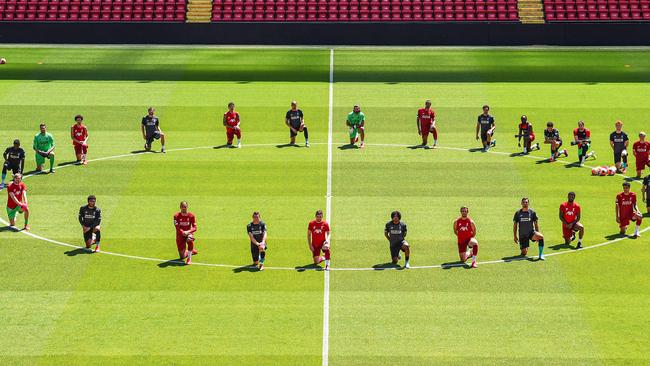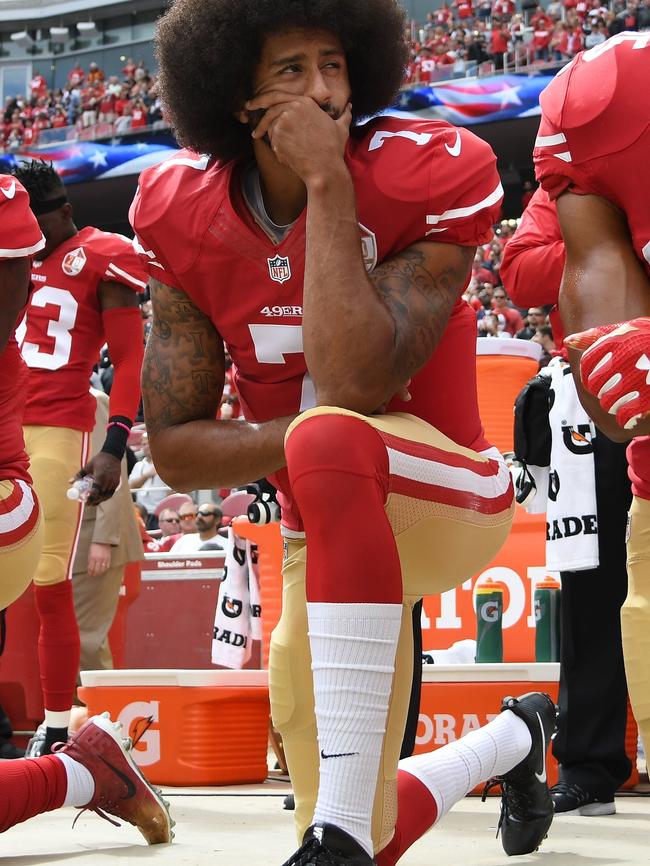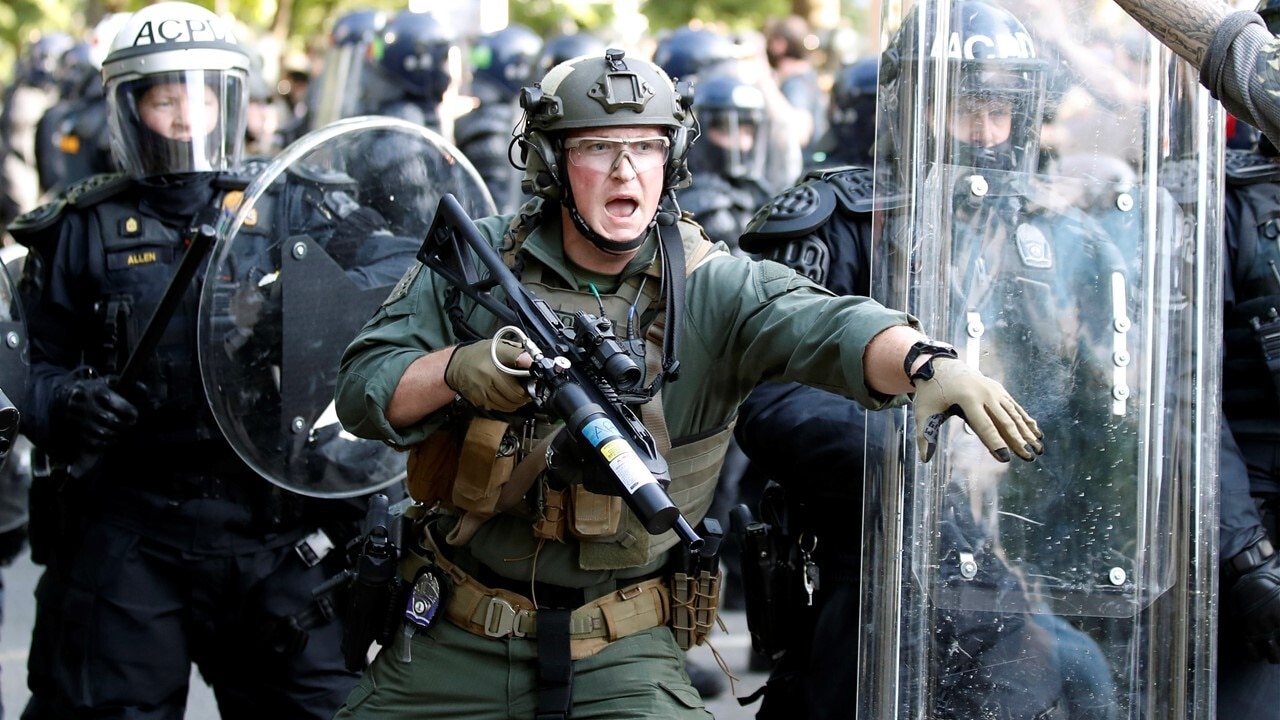Footballers have their say on racism
The patronising, archaic view that footballers should let their feet do the talking has long gone.

Take a knee, take a stand, take a bow, Liverpool. Early on Tuesday, Trent Alexander-Arnold and the rest of the English Premier League champions-in-waiting began posting images of the squad spread around the centre circle at Anfield, making a protest about police brutality towards black citizens, in the manner of the American football quarterback Colin Kaepernick.
Alexander-Arnold, one of Liverpool’s many role-models for his work on the field and in the community, was among the first to tweet the picture, followed by Andy Robertson, Virgil van Dijk, Dejan Lovren, James Milner, Joe Gomez, and others. Liverpool retweeted some of their co-ordinated tweets on their timeline, backing their players’ stance.

It was not the club’s idea, and Premier League sides are traditionally twitchy over demonstrations perceived as political (when actually simply humanitarian), but rightly they stood with their players in their desire to protest about the death of George Floyd, an African-American who died in police custody after a white policeman knelt on his neck for nine minutes in Minneapolis on May 25.
Some of the replies on social media to Alexander-Arnold and company inevitably contained reminders of the embarrassing episode in 2011 when Liverpool wore T-shirts in support of Luis Suarez, who had been accused of racially abusing Manchester United’s Patrice Evra (and was eventually banned for eight games). Jamie Carragher later acknowledged it was a “massive mistake” to show such support.
But this is a different era, a more socially aware generation, a less pliable group, across all clubs. Players feel more emboldened in expressing heartfelt beliefs. Good. Because “silence is dangerous”. So said Lilian Thuram, fabled World Cup winner, one of the most accomplished defenders of all time, giving powerful voice to anti-racism campaigns during a visit to the International Museum of Slavery in Liverpool. By speaking out on racism, and opposing bigotry, influential players can effect change.
The blinkered who feel footballers should be seen and not heard, who cling to Victorian mill owners’ perspective on the game, ignore the deeper consciences and extensive platforms belonging to players, and the importance of the issues they address so persuasively. Silence is dangerous. The more voices heard the better, and footballers have every right to voice them, with many drawing from painful experience. Thuram was born in Guadeloupe but moved to the banlieues of Paris, enduring racism.

He visited Liverpool back in 2008, and we were sitting in a back room of the museum, talking about an exhibition they were hosting on racism. Thuram had flown in to see it and agreed to be interviewed. “Silence is dangerous,” he kept emphasising. “We must keep talking about it.” Twelve years on and we are talking about racism even more, as the cancer of prejudice still pollutes the body of life.
On Sunday, Lilian’s son, Marcus, protested the killing of Floyd by taking a knee after scoring for Borussia Monchengladbach against Union Berlin. Like his father, Thuram offered more than a gesture of protest, he suggested a way ahead. “Together is how we move forward, together is how we make a change.” Quietening those critics claiming such actions could inflame the situation, Thuram’s message of togetherness was important.
Liverpool’s players followed suit. Their message was also togetherness, running through the mantra across their tweets of “unity is strength”. All players, of all races, stood shoulder to shoulder in the fight against racism, and this has been one of the most discussed issues, the need for all sportsmen to understand that “silence is dangerous” and to speak out. Some do. Liverpool’s squad action confirmed that.
So did Harry Kane’s adept handling of the situation in Sofia last year when Raheem Sterling, Tyrone Mings and Marcus Rashford were racially abused by some Bulgarian fans. The fight against racism has to be a collective response.
Formula One world champion Lewis Hamilton challenged some within his sport for not articulating their anger at what befell Floyd. “I see those of you who are staying silent, some of you the biggest of stars yet you stay silent in the midst of injustice,” Hamilton wrote on Instagram. Some of his fellow drivers, including Australia’s Daniel Ricciardo and Charles Leclerc, posted strong messages decrying racism.
Maybe some of the other drivers were put out to be called out, but Hamilton has every right to voice his concerns, and he certainly has the platform to spread his message with 16.3 million followers on Instagram, 5.7 million on Twitter and 4.8 million on Facebook.
Hamilton was right to speak out, just as Marcus Thuram was, and Alexander-Arnold. Just as why it was right for Sterling to call out sections of the media for its negative depiction of young black players after he was abused at Stamford Bridge, why it is right for Rashford to post a strong message on Monday.
“At a time I’ve been asking people to come together, work together and be united, we appear to me more divided than ever,” Rashford posted on Instagram. “People are hurting and people need answers. Black lives matter. Black culture matters. Black communities matter. We matter.”
The patronising, archaic view that footballers should let their feet do the talking has long gone. It is uplifting to hear sportsmen and women show their substance off the field as well as on.
After scoring the first goal of his hat-trick for Borussia Dortmund against Paderborn, Jadon Sancho lifted his shirt to reveal “Justice for George Floyd” on his vest. He was booked and risks further censure from the German FA, the DFB, which will simply bring it ridicule.
The more players speak out the better. The more who use their life experiences and profile to step into politics after retirement the better.
Sterling, Rashford, Sancho and Thuram have seen more of the world, at a young age, than most. Sterling, for example, has experienced its savagery, losing his father to gunfire in Jamaica and then, after moving to London, waiting for a text from his sister after academy training at QPR to tell him where the family were sleeping that night. He’s lived more than most.
So has Lilian Thuram. A year before his visit to Liverpool, Thuram turned down the opportunity to become minister for diversity in Nicolas Sarkozy’s French government, telling Le Monde that he disagreed with Sarkozy’s politics. Thuram has always spoken out, trying to change the world, and his son continues the worthiest of missions.
At a time when the leadership abilities of politicians are being questioned, the leadership skills of sportsmen and women, whether Hamilton, Sterling or Megan Rapinoe, should be appreciated, respected and encouraged.
The Times



To join the conversation, please log in. Don't have an account? Register
Join the conversation, you are commenting as Logout